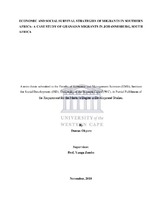Economic and social survival strategies of migrants in Southern Africa: a case study of Ghanaian migrants in Johannesburg, South Africa
Abstract
The international migrant stock has continued to grow at a fast pace increasing from 222 million
in 2010 to 244 million in 2015. Reasons for migration are diverse and include conflicts, poverty
and natural tragedies. South to South migration is the most prevalent on the African continent;
similarly, half of migrants from developing countries, the world over, are estimated to reside in
other developing countries. South Africa is amongst the continent’s most popular destinations for
Africa’s migrants. Among the international migrants of African descent who reside in South
Africa, are Ghanaians; a migrant population rarely considered by migration studies conducted in
the country. Ghanaians receive less than 5% of the permits granted by South Africa to migrants
every year. Among this lot of migrants, are undocumented Ghanaians who live in the country with
little or no social protection. They are exposed to various health and social conditions and resort
to survivalist strategies as a coping mechanism. However, very little is known about the specifics
of the aforementioned challenges and the strategies they use to cope with these, in South Africa,
for studies in this regard are largely non-existent. With the aim of filling this gap, this study
explores the economic and social survival strategies of Ghanaian migrants in Johannesburg, South
Africa. Using qualitative research methods, it draws data from 10 Key Informant Individual
Interviews and three Focus Group Discussions (FGD) and analyses the experiences of documented
and undocumented Ghanaian migrants in relation to access to livelihood, health, housing and their
use of social networks in South Africa. The findings of this research indicated that economic
reason is the main push factor for the migration of Ghanaians to South Africa. It is hoped that the
relevant authorities in Ghana and South Africa that are positioned to address the challenges faced
by migrants will find the results of this study useful in their efforts to mitigate the plight of
documented and undocumented Ghanaian migrants in the informal sector of South Africa.

